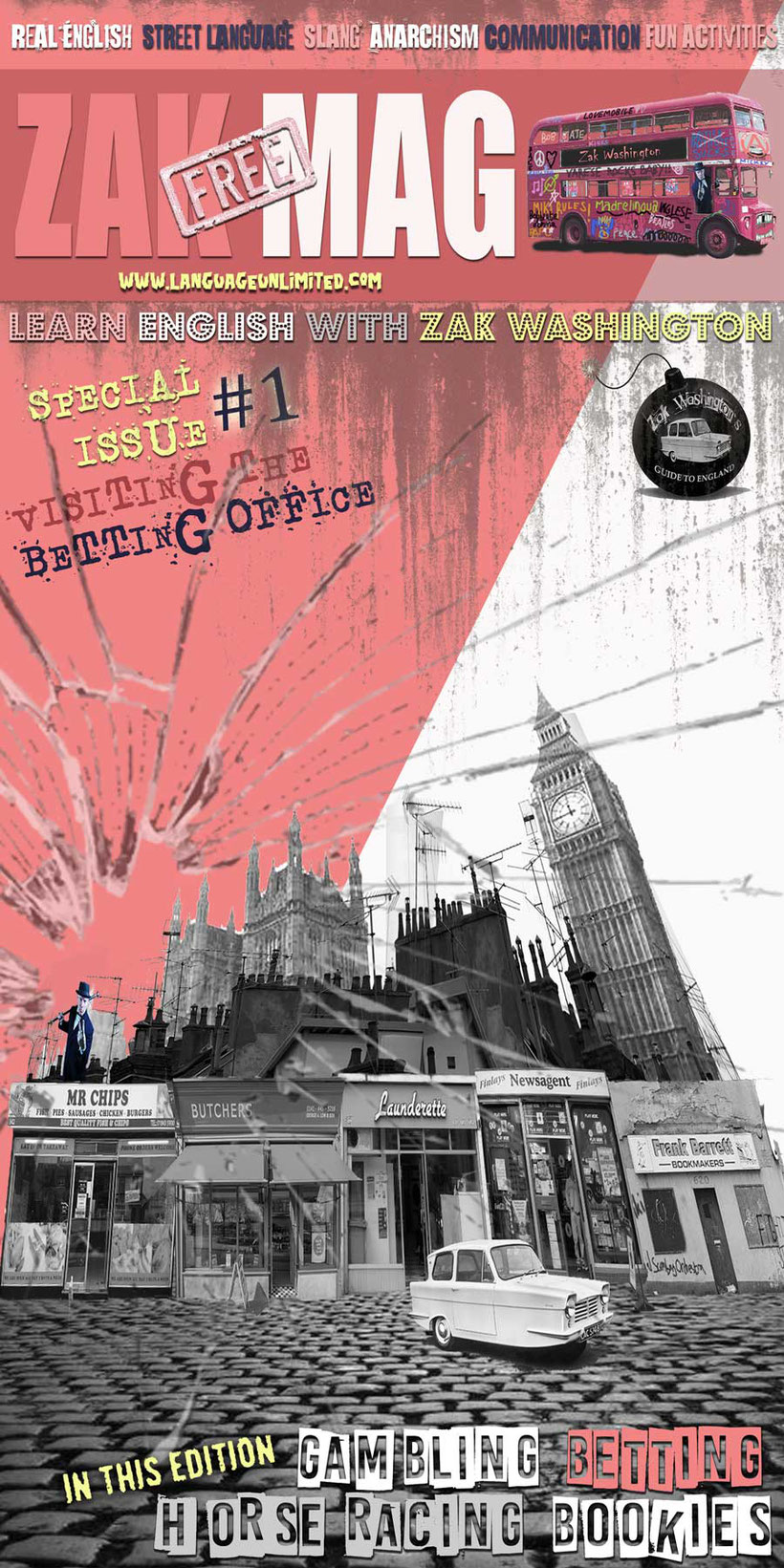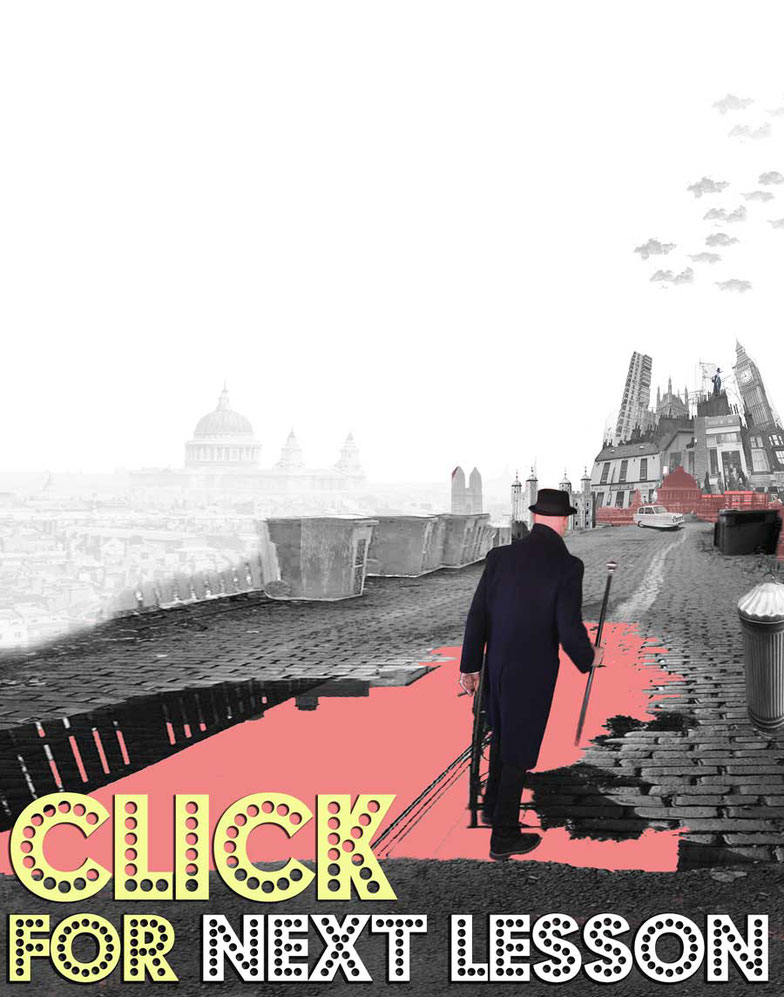LEARN real ENGLISH LANGUAGE & CULTURE- LESSON 1

World's largest free non-profit English language course

In Lesson 1 you will learn English for betting shops (SP: casas de apuestas IT: negozi di scommesse).
We will explain the vocabulary for gambling and gaming (SP: el juego IT: giochi d'azzardo).
Next we teach you how to make a bet (SP: apostar IT: scommettere).
In this lesson there is also an English language video tutorial to explain How to say 'Hello' in 10 fun
ways.
Finally, students practice with communication activities, quizzes and games.

British culture: Raleigh Chopper bike - the coolest (SP: más guay IT: più appariscente, alla moda) and most popular bicycle for kids (SP: chavales, niños IT: ragazzini) in the 1970s.

ZakWashington, the corrupt English teacher, is too lazy to work at the language school, so he is taking his group of students to visit a ‘cultural’ place of interest. Today we are going to…..
THE BETTING SHOP

WATCH THE VIDEO TUTORIAL:


VOCABULARY GLOSSARY ENGLISH, SPANISH & ITALIAN
Vocabulary used in this lesson of LEARN ENGLISH WITH ZakWASHINGTON


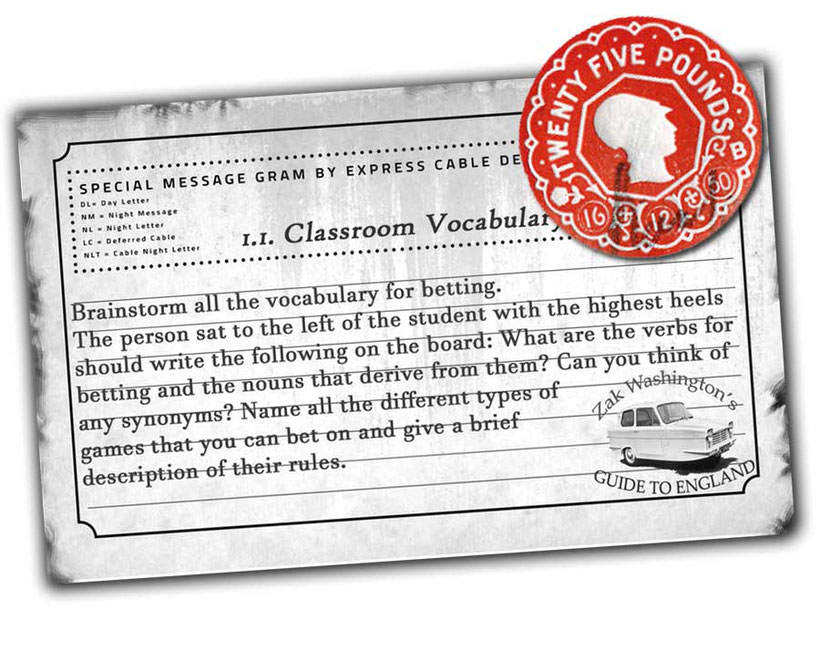

DISCUSSION TOPICS What do you think people do in a betting shop? What will the inside of one of these places be like? How common do you think they are in Britain? Where else is gambling (SP: el juego IT: giochi d'azzardo) legal? What type of people do you think go to such establishments?



ENGLISH LANGUAGE STUDENT’S MAGAZINE (Smartphone-friendly version)
Improve your English reading interesting stuff! CLICK for a FREE copy of ZAKMAG magazine. Contains material for this lesson.
This is the transcription of the video of
ZakWASHINGTON'S GUIDE TO ENGLAND
Lesson 1:


Listening Exercise
CHAPTER 1 SONG 1 – THE BETTING SHOP
Listen to the song above and draw a picture of the inside of the betting shop, according to the description.
1.3A. Explain why you think there are so many different names for a betting shop.



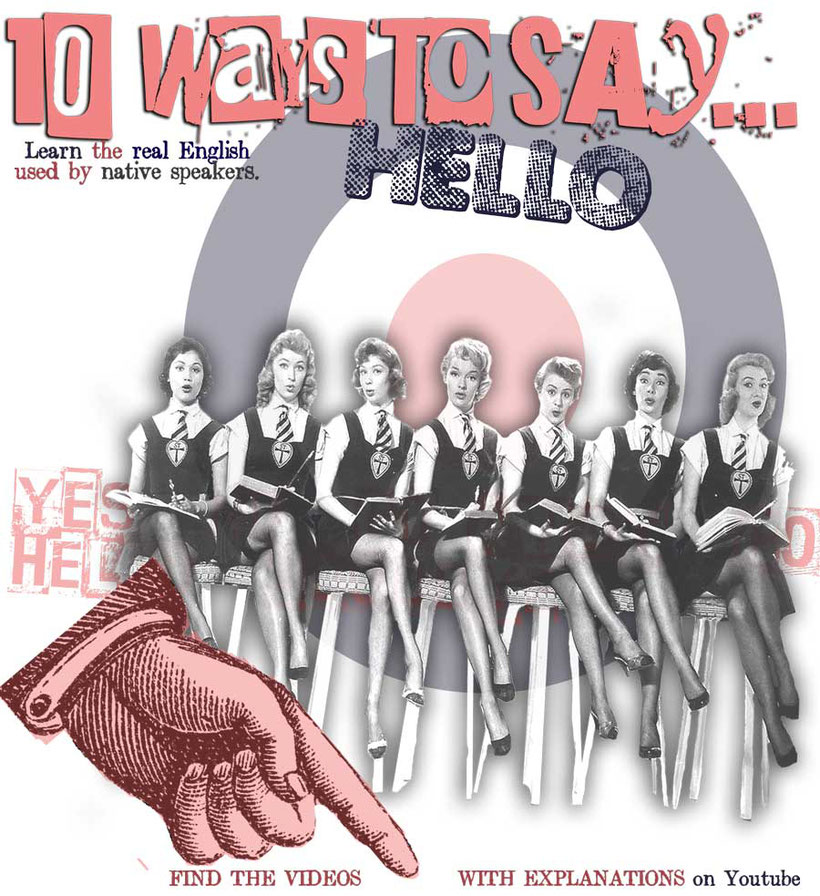

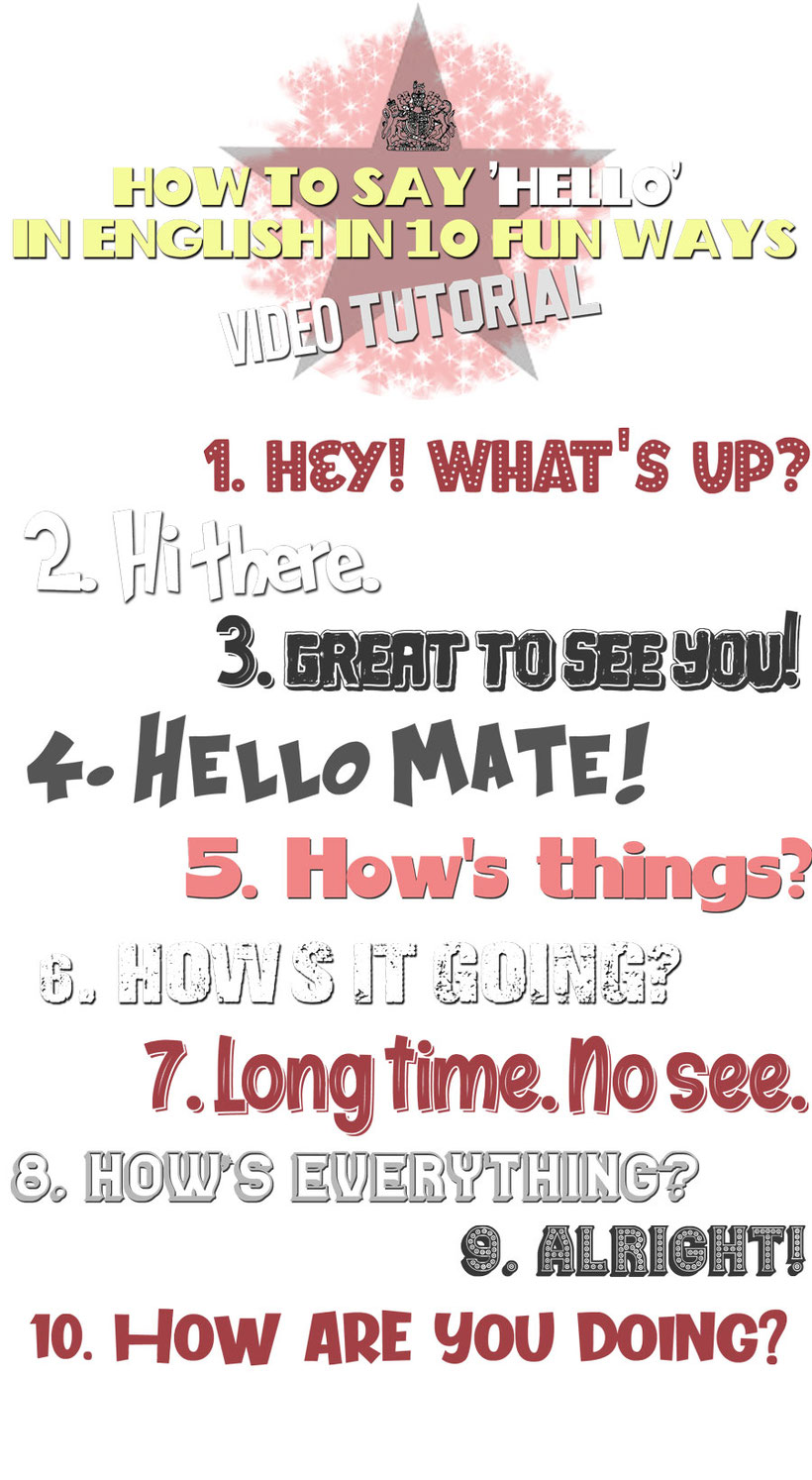


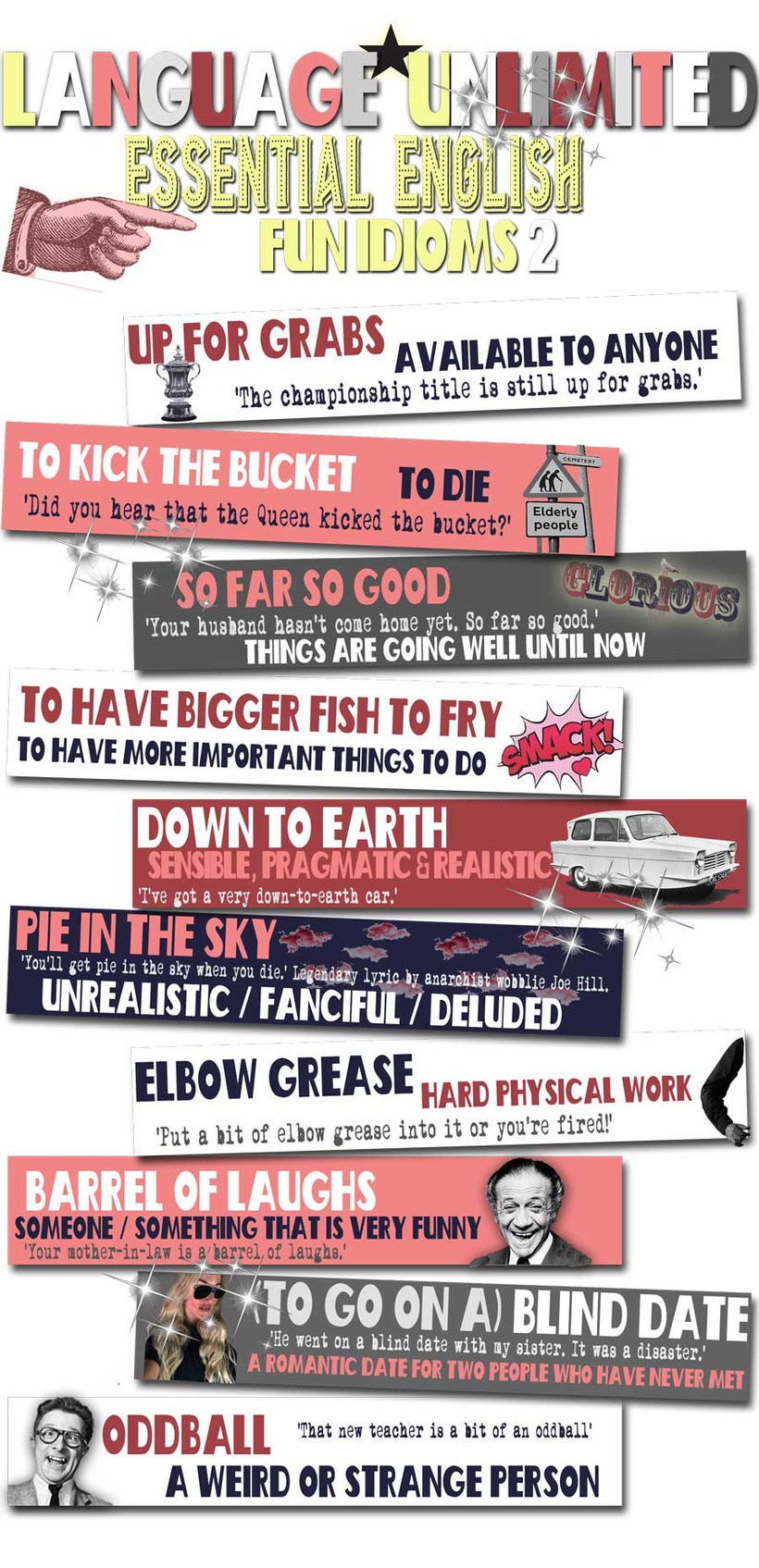
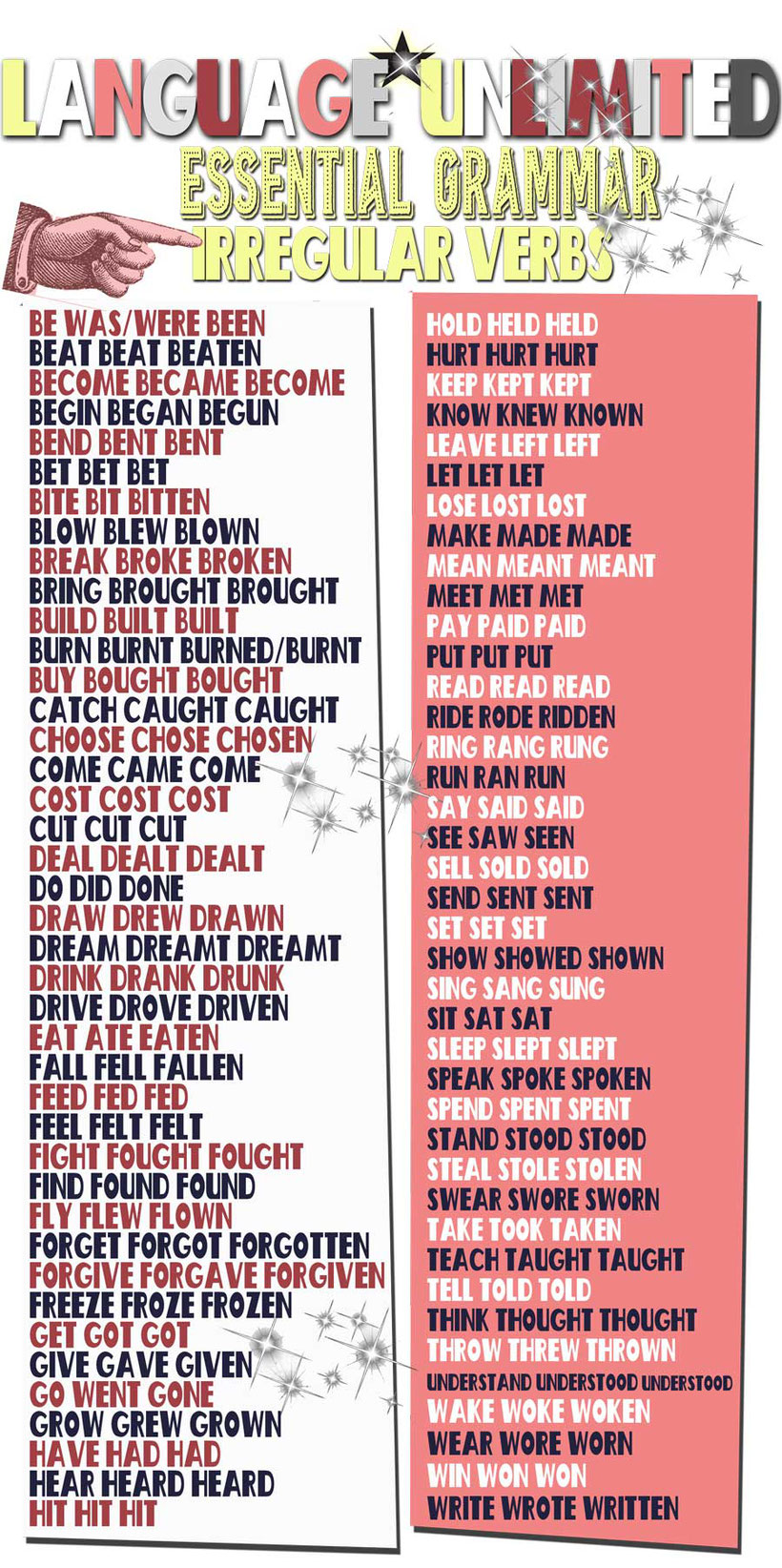

Some VERBS in English can only be followed by the GERUND.
Some only by the INFINITIVE. Some by both.
CLASSES Discuss the grammar with teacher’s pet. (SP: empollona: IT: secchione)
(This is the person who always sits near the teacher and tries to dominate and answer all the questions.)
Each time, during the course, that you find a verb that takes one of these structures, add it to the list.


Here is an exercise for VERBS + GERUND or INFINITIVE. This is found in our English language learning magazine ZAKMAG - free every month in your email to all LEARN ENGLISH WITH ZakWASHINGTON subscribers.

WHAT TIME DO THEY START...
IF THE FOOD IS DISGUSTING (SP: asqueros IT: schifoso), YOU SHOULD PRETEND (SP: fingir IT: fare finta)...
IN MADAME TUSSAUD’S YOU RISK...
PAQUITO IS RICH AND HAS DECIDED...
DO THE MEN IN THE BETTING OFFICE WANT...?
IN LONDON EVERYBODY ENJOYS...
WHEN WE ENTERED THE BETTING OFFICE EVERYBODY STOPPED....
THE ‘BOOKIE’ REFUSED...
I CAN’T AFFORD [1].....
WHEN THE RACE IS OVER DO YOU FANCY [2]....?
MY WIFE SPOKE TO ME ABOUT GAMBLING (SP: el juego IT: giochi d'azzardo) AND I PROMISED...
YOU’VE WON LOTS OF CASH. YOU DESERVE (SP: merecer IT: meritare)....
THE RACE IS STARTING. I HOPE...
I’M ADDICTED TO WHISKY, WOMEN AND GAMBLING. I CAN’T AVOID (SP: evitar IT: evitare)...
THIS EXERCISE IS REALLY BORING (SP: aburrido IT: noioso), I DON’T FEEL LIKE [3]...
GLOSSARY & USAGE
[1] To afford (SP: permitir el lujo IT: permettere) to be able to pay for something. Normally used in the negative and interrogative with ‘can’ and ‘can’t’.
[2] To fancy (colloq.) (1.) (SP: tener ganas IT: avere voglia di) to have the desire to, to want to. An essential verb for your vocabulary, as this is probably the easiest and most common way of asking someone if they would like to do something; What do you fancy doing? Do you fancy going to the theatre or the opera? Neither. I fancy staying at home watching Rambo on TV.
(2.) (SP: te gusta IT: ti piace) a funny and colloquial way of saying that you find someone attractive, although you should be careful, as you could end up sounding like a teenager; ‘My friend over there at the bar says that he really fancies you and would like to buy you a drink.’ ‘I like you as a friend, but I just don’t fancy you.’
[3] To feel like (SP: tener ganas IT: avere voglia di) more or less the same as ‘to fancy’ when the meaning is ‘to want to’. (see above).
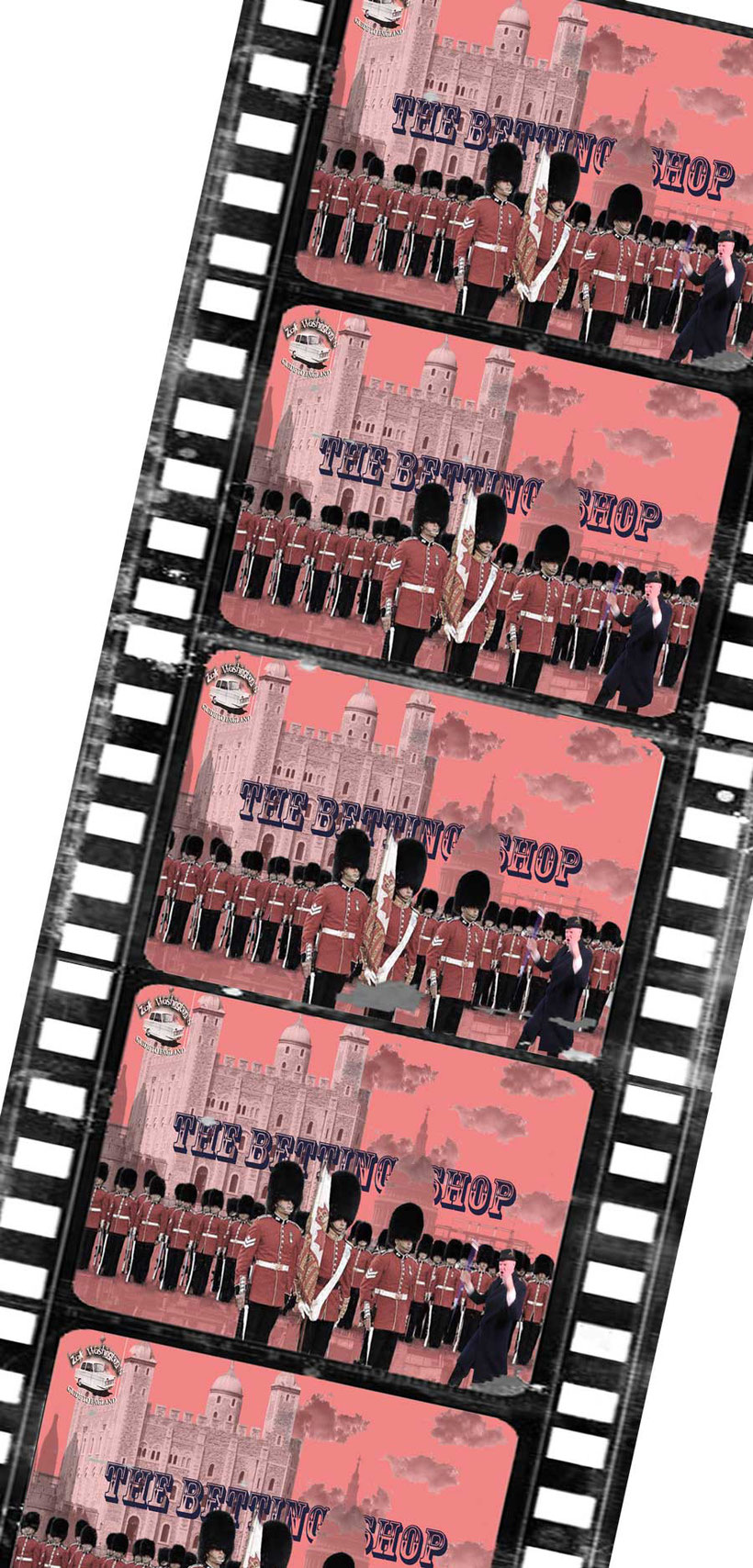
LISTENING EXERCISE
1.6. Phrasal verbs. Listen to what ZakWashington says then explain the meaning of the verbs.

CHAPTER 1 SONG 2 - HOW TO MAKE A BET IN A BETTING SHOP
(SP: Como hacer una impuesta IT: Come scommettere in un negozi di scommesse. )
GIOVANNI: Everybody is watching the horse race and shouting words that I don't understand.
ZAK WASHINGTON: They are swearwords [1]. I'll teach you those next week.
GIOVANNI: Why don’t these people work?
ZAK WASHINGTON: Because they are helping the community by giving their money to the people who work here. Helping others. It’s ‘charity’. (SP: caridad IT: carità ) At least that is what I said to my ex-wife (SP: ex-mujer IT: ex-moglia).
ANJA: What do I have to do?
ZAK WASHINGTON: Go over there. Look up the odds. Choose from the football, horses or dogs. Find out the next race. Pick up a pen. Check out the newspapers…
FRANCOIS: …and then?
ZAK WASHINGTON…. Pick out a horse. Put down its name. Pick out the horse with the most stupid name. Take out the betting slip, write it down there, give it to the lady with the blond hair.
GIOVANNI: Here’s a horse here called Nagbag (SP: regañona IT: persona assillante ). It’s 12-1. What does that mean?
ZAK WASHINGTON: That means you win twelve pounds for each pound (SP: libra IT: sterlina) you bet. Bet £1 on the horse and you will get…. £12 back, plus the ‘stake’. You got it?
GIOVANNI: Steak! Steak! (SP: bistec IT: bistecca) I like the steak very much! I like meat! Great because I’m getting very hungry.
ZAK WASHINGTON: No a stake (SP: apuesta IT: scommessa). It means a ‘bet’. A ‘stake’ is a type of bet, but it has the same pronunciation as a piece of ‘meat’… you know the type of meat that you eat. Stake? …meat? You understand what I’m talking about? …. Whatever! (SP: da iqual IT: non importa)
ANJA: Now the race is starting! This is very exciting!
ZAK WASHINGTON: They’re off. Our one is in second! But... I think he’s going to pass by the others... Yeah! He’s moving up through the field. Oh, no he isn’t. He’s falling back. He’s tripped up. The jockey has fallen off. He’s going to end up last. Yeah, he’s finished last. Damn! Ah, well....Let’s clear off. I can’t afford to throw any more money away. Let’s get over to the dole office. Come on. Come on you lot! Shift yer bleedin’ arse!
[1] Swearwords (noun) (SP: palabrotas IT: parolacce) rude, crude, offensive, taboo words. For more details consult Chapter 16.

DISCUSSION TOPICS
Is gambling legal in your country? If so, where and when can you do it? What kind of people goes to these places? What kind of illegal gambling takes place? What forms of betting should be legal/illegal? Is gambling immoral? Should betting be permitted in class? What kind of gambling could we use in class to make the lessons more interesting?



1.8 ENGLISH GRAMMAR EXERCISE
Here is an exercise for VERBS + GERUND or INFINITIVE. This is found in our magazine ZAKMAG - free every month to all LEARN ENGLISH WITH ZAK WASHINGTON subscribers.

You wanted a ‘normal’ tourist holiday, but you joined up with a group of badly behaved students on an ‘alternative tour’ of Britain. (regret) (SP: arrepentirse de IT: rimpiangere )
They interrupted the tourist itinerary and visited a local pub. (stop)
It’s freezing cold in London, and you didn’t remember your gloves (SP: guantes IT: guanti ). (forget)
The weather is depressing. The people are unfriendly. The food is an insult to your Mediterranean taste (SP: gusto IT: gusto). (not recommend)
You want to go home, but you haven’t confessed your secret to anybody. (admit)
You would like to meet a rich Englishman/woman who would pay your bills (SP: cuentas IT: bollette). (hope)
Your English is terrible. People won’t stop shouting at you. (keep on [1])
You have cash-flow problems that are limiting your tourist possibilities. (can’t afford)
Your bed in the hostel is like a rock (SP: piedra IT: pietra ). At home you have a lovely soft comfy one. (miss)
You wanted a ticket for ‘Phantom of the Opera’. There were 4000 Japanese tourists in the queue (SP: cola IT: coda) in front of you. They bought them all. (not manage[2])
You don’t want to be robbed, but you just look so foreign. People rob you. You can’t avoid (SP: evitar IT: evitare) it. (can’t help)
GLOSSARY & USAGE
[1] (to) keep on (SP: continuar IT: continuare) to continue, to go on, to carry on etc. Note that all of these verbs, when followed by another verb, need to take the gerund; ‘Keep on trying, eventually you’ll get it right.’
[2] (to) manage to (SP: lograr, conseguir IT: riuscire) Very different from the verb to manage. ‘Manage to’ means to succeed in doing something, normally when there is an element of difficulty. It is similar to ‘can’ and ‘could’ but is for a single action. ‘To manage’ without the preposition is from the word family which includes manager, management and has the meaning of giving orders, controlling and directing. Compare the following: ‘He manages the top football team in Peckham.’ ‘He managed to eat fifty eggs in an hour’.


ENGLISH VOCABULARY EXPLAIN THE DIFFERENCE
This vocabulary activity you can do individually or in the classroom. The solutions can be found in the ANSWER KEY or on the back page of this month's ZAKMAG #2 (link in sidebar).

1.9. Explain the differences.
Bad drivers. / Women drivers.
As there was a posh party at the Ritz, he decided to get dressed. / As there was a posh party at the Ritz, he decided to get dressed up.
She picked up the phone in disgust. / She hung up the phone in disgust.
At ten o’clock we broke out the bottles of champagne. / At ten o’clock we broke the bottles of champagne.
I’m anxious to tell my mum that I’ve got a new boyfriend. / I’m anxious about telling my mum that I’ve got a new boyfriend.
An ancient mummy./ An old lady. / An antique doll.
Reuter’s News Agency. / Patel’s Newsagent’s.
I missed the bus./ I lost the bus.
Little people live in the centre of London. / Few people live in the centre of London.
He came to the party wearing a three-piece suite. / He came to the party wearing a three-piece suit.



CLASS ACTIVITY: OFFICIAL ‘ENGLISH LANGUAGE LEAGUE OF CHAMPIONS’
To make this class more interesting we are going to organise a league (SP: liga IT: lega). Every time we play competitive games, we are going to keep a record and a league table. You must decide who the teams will be. Ideal number: 2-3. Girls against boys, perhaps? Discuss how you are going to organise the league, the points system, and most importantly, what the prize at the end will be.

BLOCKHEADS! General English Quiz.
HOW TO PLAY
This a game to be played by two teams. Ideally with one or two players per team. (Larger classes can divide themselves into smaller groups.)
· Team A will play from the top of the page to the bottom; Team B from the left to the right. Take it in turns to ask each other question. If you answer correctly - colour in the square on the board.
· The objective is to get from one side of the board to the other, by the quickest route possible. You cannot jump squares, but you can go straight ahead, or diagonally.
· If you answer correctly you can make a line from one side to the other. But, you cannot cross the other team’s line. You must try to block your opponent’s route, so that they have to go round you.
· The winner is the first team to answer enough questions to arrive at the other side of the board.
· Each team has a separate question sheet. The questions must be asked in the order in which they appear.
· The two question sheets are on the next pages. Do not look at the other team’s page.
· If these rules are too complicated, make up your own.

CLASS HAND-OUT VERSION:


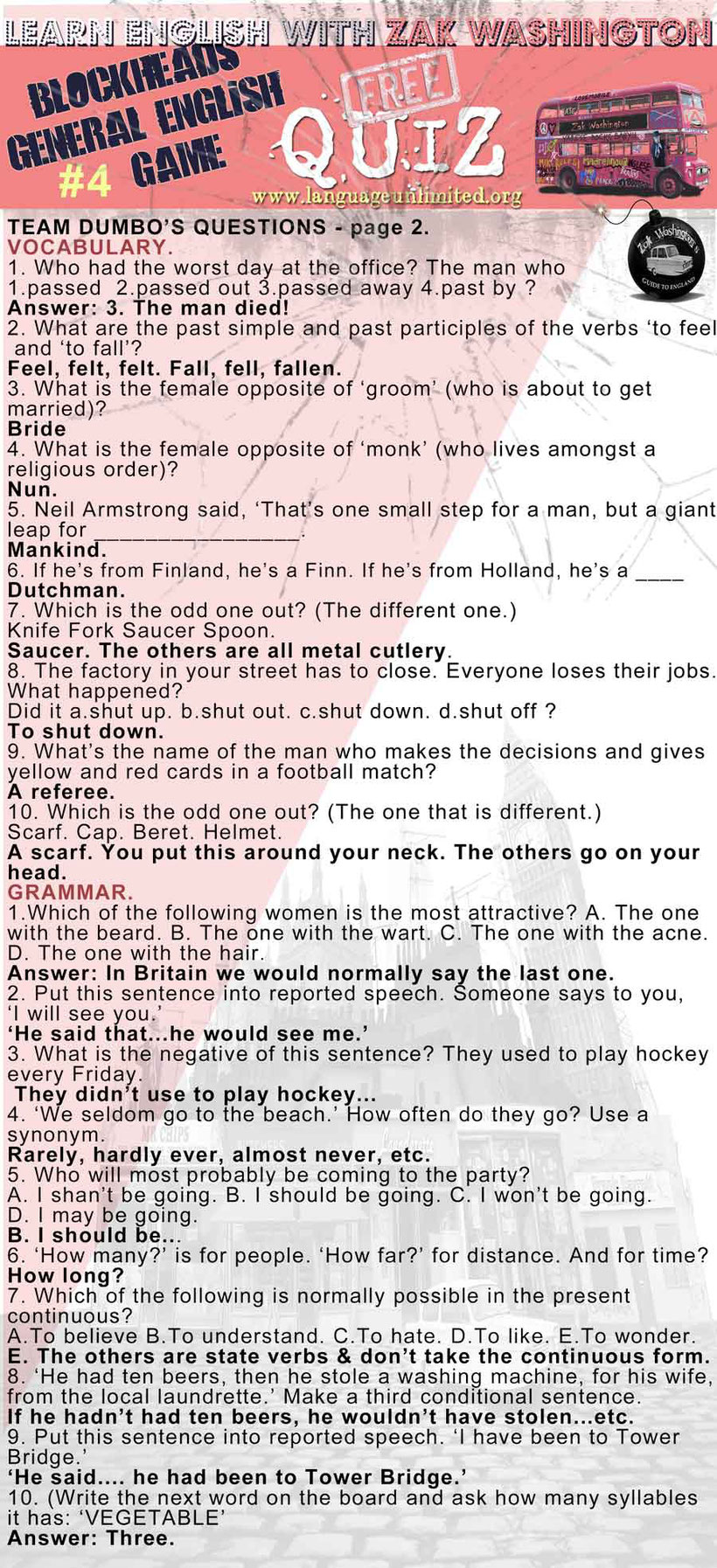
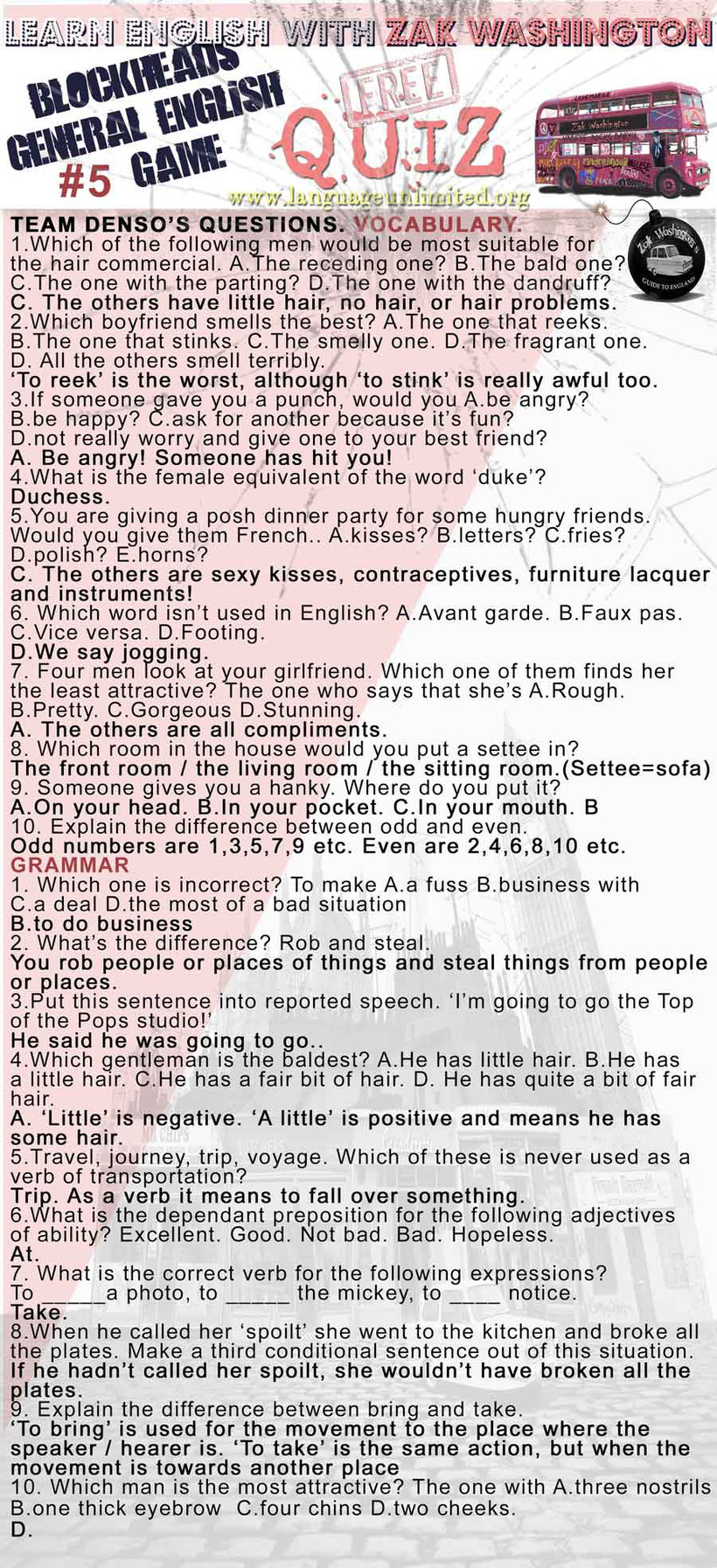
ENGLISH LANGUAGE GRAMMAR & VOCABULARY EXERCISE
COPIABLE VERSION of English language TEFL vocabulary game. (Same as above - cut and paste and use in your own #EFL activities:
TEAM DUMBO’S QUESTIONS.
MULTI-PART VERBS. Read the sentence slowly and clearly. The answer is written at the end.
1. If someone kept singing the same Julio Iglesias song for fifteen hours, would you get A.turned off? B.switched off? C.cheesed off? D.sent off? Answer: C. ‘Cheesed off’ means fed up, tired, or bored with.
2. Explain the difference between these sentences; ‘After getting drunk at the office party, I ended up with the boss’ wife.’ ‘After getting drunk at the office party, I finished off the boss’ wife.’ In the first case you probably finished the night in her arms. In the second you probably killed her.
3. Do you think that I’d ____ in with them? I’m a poor working class dustman, and they’re aristocrats. To fit (in)
4. Don’t answer me _________ , you impertinent little husband! To answer someone back
5. Oh no! The car has stopped! Ten miles from a petrol station and we have _____ ______ ______ petrol. To run out of
6. I love that bikini in the department store. Will it fit me? Do you think they will let me ______ it _______? To try on
7. I’ve had these shoes for eight years. They are completely _______ ________. To wear out
8. That woman always arrives late. I wonder what time she will _____ ____ today To turn up / to show up
9. After the party we had to _______ _______ because the place was in such a mess. To clean up / to tidy up
10. I haven’t got a girlfriend, and I really fancy you. Will you _______ _______ _______ me? To go out with
SPELLING. Read the words to the other team, and ask them how they spell each. Separately, beautifully, honourably (British spelling), Dutchman, swearword, dumb, weapon, wastepaper, psychotic, drawers (the noun!)
MODAL VERBS. The other team has to complete the sentence using an appropriate modal verb.
1. Jackie is pregnant, but her husband has been working in Egypt for the last year. It __________ be his! Can’t
2. There is someone at the door. I don’t know who it is, but it ____________ be Big Dave. Might, may, could.
3. What is the past tense of the following sentence? I mustn’t smoke in the house. Clue: You cannot use ‘could’ as the answer. I wasn’t allowed/ was prohibited from/ wasn’t permitted to smoke in the house.
4. It’s not necessary, but you ___________ to turn off your mobile during the service. It’s a recommendation. Ought.
5. What is the negative of this sentence? You had better come and see me, if you need money. Had better not.
6. He’s drunk. His face is red. He’s ugly. He’s wearing a kilt. He ____________ be Scottish. Must
7. He’s drunk, red-faced and too handsome. He’s wearing an England football shirt. He ___________ be Scottish. Can’t
8. What is the negative of ‘shall’? Shan’t
9. In a situation like that I think I __________ cry with excitement! Would
10.What is the contraction of the opposite of might? Mightn’t
VOCABULARY.
1. Who had the worst day at the office? The man who 1.passed 2.passed out 3.passed away 4.past by ? 3. The man died!
2. What are the past simple and past participles of the verbs ‘to feel’ and ‘to fall’? Feel, felt, felt. Fall, fell, fallen.
3. What is the female opposite of ‘groom’ (who is about to get married)? Bride
4. What is the female opposite of ‘monk’ (who lives amongst a religious order)? Nun.
5. Neil Armstrong said, ‘That’s one small step for a man, but a giant leap for ________________. Mankind.
6. If he’s from Finland, he is a Finn. If he’s from Holland, he’s a _____________ Dutchman.
7. Which is the odd one out? (The different one.) Knife Fork Saucer Spoon. Saucer. The others are all metal cutlery.
8. The factory in your street has to close. Everyone loses their jobs. What happened? Did it a.shut up. b.shut out. c.shut down. d.shut off ? To shut down.
9. What’s the name of the man who makes the decisions and gives yellow and red cards in a football match? A referee.
10. Which is the odd one out? (The one that is different.) Scarf. Cap. Beret. Helmet. A scarf. You put this around your neck. The others go on your head.
GRAMMAR.
1.Which of the following women is the most attractive? A. The one with the beard. B. The one with the wart. C. The one with the acne. D. The one with the hair. In Britain we would normally say the last one. Some nationalities might have different tastes.
2. Put this sentence into reported speech. Someone says to you, ‘I will see you.’ ‘He said that...he would see me.’
3. What is the negative of this sentence? They used to play hockey every Friday. They didn’t use to play hockey...
4. ‘We seldom go to the beach.’ How often do they go? Use a synonym. Rarely, hardly ever, almost never, etc.
5. Who will most probably be coming to the party? A. I shan’t be going. B. I should be going. C. I won’t be going. D. I may be going. B. I should be...
6. ‘How many?’ is for people. ‘How far?’ for distance. And for time? How long?
7. Which of the following is normally possible in the present continuous? A.To believe B.To understand. C.To hate. D.To like. E.To wonder. E. The others are state verbs, and take the present simple instead of the continuous form.
8. ‘He had ten beers, then he stole a washing machine, for his wife, from the local laundrette.’ Make a third conditional sentence out of this situation. If he hadn’t had ten beers, he wouldn’t have stolen...etc.
9. Put this sentence into reported speech. ‘I have been to Tower Bridge.’ ‘He said.... he had been to Tower Bridge.’
10. Write the next word on the board and ask how many syllables it has. ‘VEGETABLE’ Three.
COPIABLE VERSION of English language TEFL vocabulary game. Part 2 (Same as above - cut and paste and use in your own #EFL activities:
TEAM DENSO’S QUESTIONS.
MULTI-PART VERBS. Read the sentence slowly and clearly. The answer is written at the end.
1. He was born in Hackney, and was ______ ______ there by his parents, who educated him well. To bring up.
2. Can you please __________ that bloody CD player? I don’t mind you having it on, but just a bit quieter. To turn down.
3. Which is correct? ‘See you later! I’m off! / I’m in! / I’m out! / I’m away! I’m off.4. You are not allowed to eat sweets in my class, you nasty little boy! ________ it ________ now. To spit out
5. Oh mum! We’ve been shopping all morning! I’m getting so ________ ________. Can’t we have a rest? To tire out
6. Did you _____ ______ all the parmesan cheese yesterday or is there still a bit left that we can use today? To use up.
7. Waiter! This food’s cold! Can you _______ it ________ for me? To warm something up.
8. Whenever my neighbour’s alarm clock _____ _____ he never turns it off. He wakes up the whole block. To go off.
9. _________ out! Extremely dangerous electric cables inside! Keep out!
10. That was a terrible foul. He should get a red card for that! Go on ref! ________ him _________! To send off
SPELLING. Read the words ask the other team how to spell them. Autumn. Doubtful. Cupboard. Tomb. Exhaust. Antidisestablishmentarianism. Authorise. Yuppy/Yuppie. Cough. Laughing. Jealousy. Lawful. Receive. Column. Knee.
MODAL VERBS. The other team has to complete the sentence using an appropriate modal verb.
1. What is the past tense of the following sentence? ‘She might not be coming.’ She might not have been coming.
2. What’s the future tense of this sentence? ‘The team could play much better last year.’ The team will be able to play....
3. ‘There’s Helen Brown! She’s as big as an elephant!’ ‘No, you’re wrong. That _________ be her. She never looked that good. Don’t you think big girls are beautiful?’ Can’t
4. ‘Hello! Helen Brown! Over here!’ ‘She can’t hear you.’ ‘She _______ be able to hear me. I’m shouting!’ Must.
5. What’s the future tense of this sentence? ‘Dad says that I must be home by ten.’ ‘Dad says that I will have to be....’
6. Who is the most interested in you? 1.You’d better go out with me. 2.You ought to go out with me. 3.You’ve got to go out with me. Number three really wants to go out with you. Number one and two would like to too, but not as much.
7. ‘With tips as big as those, who ________ want to work anywhere else?’ Would
8. Which of the following is not for deduction / possibility. May, might, could, should, or can’t. Should is for advice.
9. What’s the past of ‘mustn’t’? There isn’t a past form. You need ‘to not be allowed to’, ‘not be permitted’, etc.
10.‘That must be your cousin Aleister over there, with blue hair!’ ‘No, it _______ be him. His hair is now orange.’ Can’t
VOCABULARY.
1.Which of the following men would be most suitable for the hair commercial. A.The receding one? B.The bald one? C.The one with the parting? D.The one with the dandruff? C. The others have little hair, no hair, or hair problems.
2.Which boyfriend smells the best? A.The one that reeks. B.The one that stinks. C.The smelly one. D.The fragrant one. D. All the others smell terribly.‘To reek’ is the worst smelling, although ‘to stink’ is really awful too.
3.If someone gave you a punch, would you A.be angry? B.be happy? C.ask for another because it’s fun? D.not really worry and give one to your best friend? A. Be angry! Someone has hit you!
4.What is the female equivalent of the word ‘duke’? Duchess.
5.You are giving a posh dinner party for some hungry friends. Would you give them French A.kisses? B.letters? C.fries? D.polish? E.horns? C. The others are sexy kisses, contraceptives, furniture lacquer, and instruments!
6. Which word isn’t used in English? A.Avant garde. B.Faux pas. C.Vice versa. D.Footing. D.We say jogging.
7. Four men look at your girlfriend. Which one of them finds her the least attractive? The one who says that she’s A.Rough. B.Pretty. C.Gorgeous D.Stunning. A. The others are all compliments.
8. Which room in the house would you put a settee in? The front room / the living room / the sitting room.
9. Someone gives you a hanky. Where do you put it? A.On your head. B.In your pocket. C.In your mouth. B
10. Explain the difference between odd and even. Odd numbers are 1,3,5,7,9 etc. Even are 2,4,6,8,10 etc.
GRAMMAR.
1. Which one is incorrect? To make A.a fuss B.business with C.a deal D.the most of a bad situation B.to do business
2. What’s the difference? Rob and steal. You rob people or places of things and steal things from people or places.
3.Put this sentence into reported speech. ‘I’m going to go the Top of the Pops studio!’ He said..he was going to go..
4.Which gentleman is the baldest? A.He has little hair. B.He has a little hair. C.He has a fair bit of hair. D. He has quite a bit of fair hair. A. Little is negative. A little is positive, and means he has some hair.
5.Travel, journey, trip, voyage. Which of these is never used as a verb of transportation? Trip. As a verb it means to fall over something.
6.What is the dependant preposition for the following adjectives of ability? Excellent. Good. Not bad. Bad. Hopeless. At.
7. What is the correct verb for the following expressions? To _____a photo, to _____ the mickey, to ____ notice. Take.
8.When he called her ‘spoilt’ she went to the kitchen and broke all the plates. Make a third conditional sentence out of this situation. If he hadn’t called her spoilt, she wouldn’t have broken all the plates.
9. Explain the difference between bring and take. ‘To bring’ is used for the movement to the place where the speaker/hearer is. ‘To take’ is the same action, but when the movement is towards another place.
10. Which man is the most attractive? The one with A.three nostrils B.one thick eyebrow C.four chins D.two cheeks. D.
PROGRESS TEST CLICK BELOW


